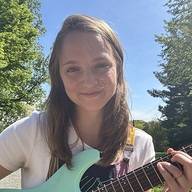The year is 2013. Jeggings are IN, Taylor Swift has just released “I Knew You Were Trouble,” and I am in my living room learning a jazz piece called “Curtains Up.” But something else is happening in that living room that will alter the course of the world (or my world, anyway): music therapy.
You may be thinking, “She’s playing a complex piece of music and feeling the psychological, cognitive, and emotional benefits from it1. That’s music therapy!”
You’re on to something, but that’s not quite right.
“Okay,” you say. “Music creates an outlet for emotional expression2, which explains why she keeps doing the scream part from ‘I Knew You Were Trouble’ every time she gets annoyed with her piece.”
Still an excellent guess! It seems that you, like many of us, inherently understand the way music plays a therapeutic role in our daily lives. But you are still not correct, because I’ve actually tricked you and not told you what else was happening in my living room in 2013. Besides scream jazz—which is a genre someone should invent, because I just checked and it’s not on Spotify.
While I’m finishing up my piano practice, my 3-year-old sister is sitting on the floor, watching as her beloved Miss Lizzy3 sets up the room for their session. The sweet lady with the beautiful voice (you guessed it! A music therapist) pulls out a tambourine, several egg shakers, a box of visuals, and her guitar. I watch with delight4 as she prompts my sister to select different emotions and express them through song, practice differentials like “stop and go,” and help her grasp instruments in her tiny fist. I didn’t know it at the time, but Lizzy was a healthcare professional and a scientist. Each of these interventions was targeted towards a specific therapeutic goal, with accompanying objectives, for my little sister.
It’s those goals and objectives, as well as Lizzy’s education and credentials, that make this an example of music therapy.
To become a music therapist, you must graduate with a degree in music therapy from an American Music Therapy Association (AMTA)-accredited institution. You must complete 1200-1300 clinical hours, including a 6-month clinical internship, and then pass a board certification exam to legally practice. Some states also require you to have a license. Here’s the official definition of music therapy from AMTA:
“...the clinical & evidence-based use of music interventions to accomplish individualized goals within a therapeutic relationship by a credentialed professional who has completed an approved music therapy program.”
Sometimes, people think that they have to be a skilled musician to benefit from music therapy, but that’s really not the case. If you feel music in your bones and get chill bumps when your favorite song plays, you’re a great fit! That being said, here are common populations served by music therapists:
Neurotypical individuals, or those without illness, can also benefit from music therapy as a means of self-expression, stress management, and relaxation.
What happens in a music therapy session will differ from person to person, as sessions are developed around the individuals’ goals and objectives. Here are a few interventions you or your child would likely encounter and what goals they’d potentially address:
If you have any further questions or concerns regarding music therapy, please feel free to reach out to me: caroline@themusicstudioatlanta.com. I will be so glad you did!
1 Alam, A. (2023).Does Musically Responsive School Curriculum enhance Reasoning Abilities and Helps in Cognitive Development of School Students? Interdisciplinary Perspectives on Sustainable Development: Achieving the SDGs through Education, Wellbeing, and Innovation (1st ed.).
2 Colford, Madeline (2025). “Music: A Powerful Tool to Process and Move Through Emotions.” Valued Living Therapy. https://valued-living-therapy.com/music-a-powerful-tool-to-process-and-move-through-emotions/
3 This is a pseudonym to protect the MT’s identity.
4 Typically family members are not present for music therapy sessions. Maybe the whole scream jazz thing made her think I'd benefit from a little music therapy myself.
